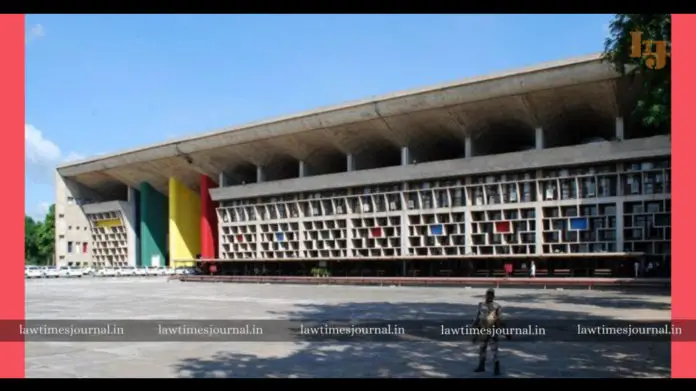
Case: Robin Gupta v. M/s Stratford Educational Management Pvt. Ltd. and others
Citation: CR No.4701 of 2019(O&M)
Coram: Hon’ble Justice Rekha Mittal
The High Court of Punjab and Haryana orders Lok Adalats to pass awards in accordance with NALSA Regulation 17.
Recently, Justice Rekha Mittal of the Punjab & Haryana High Court directed “during the long experience as a member of judiciary, I have not come across even a single case where the Lok Adalat has passed an award in compliance of provisions of Regulation 17 and specimen annexed thereto”.
“The Lok Adalats in the States of Punjab, Haryana and U.T. Chandigarh is directed to pass the award in compliance with the provisions of Regulation 17 of the regulations.”
Facts of the Case
The Bench was hearing a petition challenging the order of the Additional Civil Judge (Senior Division), Panchkula whereby execution application filed by the petitioner was dismissed.
It may be noted that, in respect of SCO No.370, Sector 8, Panchkula measuring 1053.42 square meters built up to triple storey and the plot below, the petitioner filed a suit for specific performance of the sale agreement dated 08 June 2012 agreeing to be sold by respondent No.1 via respondent No.2 for a sale consideration of Rs.9,95,00,000/-.
During the pendency of the suit, parties arrived at a settlement recorded; an application was filed for passing consent decree on the basis of compromise deed dated 09 April 2014. The application was taken up in the Lok Adalat on 12 April 2014.
The Lok Adalat acknowledged the compromise made between the parties and even reported the parties’ statements in this regard, but the suit was ultimately ordered to be dismissed as withdrawn.
The petitioner filed an execution application alleging that the JDs may be directed to comply with the compromise deed and to execute and register the sale deed before the Court in compliance with the compromise deed and the declaration made on oath.
On the other hand, the executing Court dismissed the execution application with the observations that neither there is any judgment nor any decree regarding which the execution has been filed. Since there was no decree, the execution application was said to be not maintainable and thus dismissed.
Thereafter, the petitioner filed the instant petition by invoking Article 227 of the Constitution praying for setting aside the order dated 03 December 2016.
Arguments
It was contended before the Court that Lok Adalat is a forum that can either record the settlement between the parties or help the parties reach a settlement.
The Lok Adalat cannot decide on the merits of the case and the award by the Lok Adalat is an administrative act on the basis of settlement between the parties, so the Executing Court should have proceeded with execution in order to give finality to the settlement.
The other party argued that the Lok Adalat passed an order with regard to the dismissal of suit as withdrawn on the basis of a statement made by the petitioner.
It was argued that as the Lok Adalat did not make an award under Section 21 of the Act, there was no award akin to a decree of civil Court that could be executed in the application filed by the petitioner.
It was also argued that under sub-regulation (6) of Regulation 17, Members of Lok Adalat should affix their signatures only in the settlement reached before them and should avoid affixing signatures to the settlement reached by the parties outside the Lok Adalat.
It was further argued that Lok Adalat is obligated to pass an award, specimen whereof is appended to the Regulations. Lastly, it was also contended that since in the instant case, no award in view of Regulation 17 has been passed, the order passed by the Executing Court dismissing the application couldn’t be faulted with.
Court’s Order
In the given scenario, the Court concluded that the Court had committed no illegality or material irregularity by dismissing the execution application filed by the petitioner.
Further, the Court said,
“The Act (Legal Services Authority Act, 1987) was enacted to provide legal aid to the litigants. The Lok Adalats have been set up for settlement of disputes at the pre-litigating and post litigating stage. The parties are referred to the Lok Adalat to reconcile their differences and settle their disputes without undergoing rigmarole of trial.”
The Court also said,
Undeniably, Lok Adalat cannot decide the dispute between the parties on merits and it can only facilitate settlement of the dispute with its intervention or/and pass an award on the basis of Court settlement. As such, the object and purpose of setting up of Lok Adalats are to settle the dispute and not o regenerate the dispute already settled between the parties.”
Lastly, the Court said that the order passed by the Lok Adalat should be set aside and the matter be remitted to the said Court for passing an appropriate order in view of terms and conditions of the settlement, applicant filed by the parties for passing a consent decree and statements made by the parties in respect of settlement. Accordingly, the order passed by the Lok Adalat was set aside and the matter was remitted to the said Court for passing appropriate order, in accordance with the law.








